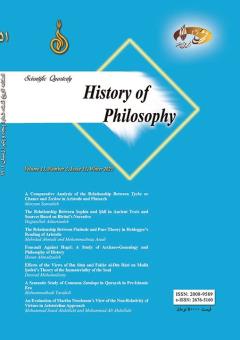The Relationship Between Finitude and Pure Theory in Heidegger’s Reading of Aristotle
Subject Areas : ریشهشناسی مکاتب و آراء فلسفی در ادوار قدیم و جدیدMehrdad Ahmadi 1 , Mohamadreza Asadi 2
1 - PhD candidate of Philosophy, Allameh Tabataba’i University, Tehran, Iran
2 - Associate Professor, Philosophy Department, Allameh Tabataba’i University, Tehran, Iran
Keywords: Finitude, theory, Truth, Aristotle, Heidegger,
Abstract :
In Aristotle’s view, theoretical activity is an emotion-free and worldless activity that leaves all negative and resisting affairs behind. As a result, because of the falsity of finitude, error has no way into theoretical activity. Accordingly, theory enjoys a specific kind of autonomy, in other words, an individual involved in pure theorizing perceives that in the course of theoretical activity he is immune to not only any emotion but also to any error in his purely theoretical activities. However, the essential point here is that in Heidegger’s view, Aristotle could never provide such a status for Man at the level of theory without undergoing a change in his understanding of existence and moving to the realm of poiesis. According to Heidegger, the horizon of ousiology of existence is the result of a transformation in the Greeks’ understanding of existence. As a result, the structural finitude of the emergence of existence and the finite position of the theoretician among existents enable him the develop an absolute knowledge of at least one existent, that is, theos or existing God. Therefore, the present paper aims to demonstrate how, based on Aristotle’s ousiology, knowledge in the sense of theorizing has turned into a deserving desire for all human beings and has emerged as a possibility for transcending the essential finitude of theory.
Aristotle(1997). Metaphysics. W.D.Ross. Cambridge university press: Cambridge
Aristotle(1994). Nicomachean Ethics. W.D.Ross. Cambridge university press: Cambridge
Heidegger, Martin(1998). Pathmarks. William McNeil. Cambirdge university press: Cambridge
Heidegger, Martin(1997). Plato's sophist. Richard Rojcewicz & Andre Schuwer. Indiana university press:Indianapolis
Heidegger, Martin(2010). Logic :the Question of Truth. Thoms Sheehan. Indiana university press:Indianapolis
Heidegger, Martin(1995). Aristotle's Metaphysics θ1-3. Walter Brogan & Peter Warnek. Inidana university press: Indianapolis
McNeil, William(1999). The Glance of the Eye. State university of newyork press:newyork
Marx, Werner(1971). Heidegger and the Tradition . Theodore Kisiel. Northwestern university press: Evanston


